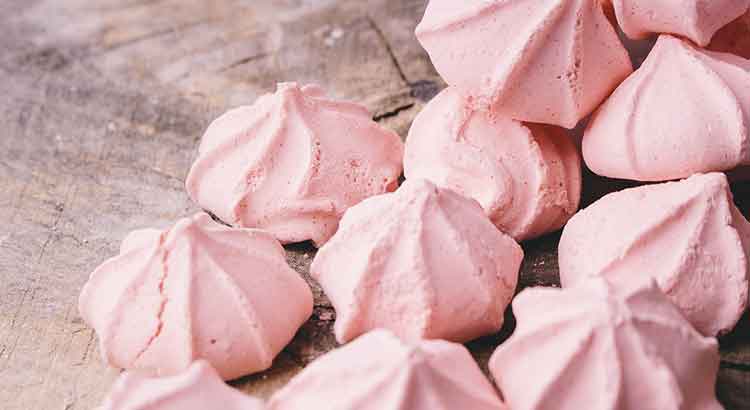Do your meringue cookies seem to stick to everything except the plate? It’s a bit like trying to catch air, isn’t it? Well, worry not, because we’ve got some sweet solutions that’ll have your meringues behaving like well-behaved clouds in no time!
The most common reason why meringue cookies end up too sticky is moisture. Excess humidity, whether it’s in the air or accidentally introduced during mixing, can transform your crispy dreams into sticky messes.
But fear not, dear baker, as we whisk away your troubles with 7 simple fixes. From adjusting your oven temperature to giving egg whites some extra love, we’ll guide you through the airy journey of meringue mastery. So, let’s dive in and rescue those cookies from the sticky abyss. Get ready to whisk, bake, and relish the delightfully airy, non-sticky meringue cookies you’ve always wanted!
Humidity
You might have noticed this on a damp, rainy day, or if your kitchen resembles a sauna after a cooking marathon. High humidity levels during the mixing process can spell disaster for your delicate meringue. The moisture interferes with the sugar and protein structure, leading to a sticky situation that’s far from what you had in mind.
But hey, don’t lose hope! To counter this, you can choose a less humid day for your meringue adventures. If that’s not possible, try using a dehumidifier in your kitchen or ensuring that your ingredients are completely dry before starting. By giving humidity the cold shoulder, you’ll be well on your way to achieving meringue perfection.
Egg Whites Residue
Let’s talk about egg whites. You might be surprised to learn that a tiny bit of egg yolk residue can wreak havoc on your meringue cookies. Even a speck of fat from the egg yolk can sabotage the fluffy structure you’re aiming for.
When you’re separating eggs, it’s crucial to be meticulous. Make sure there’s no trace of yolk in the whites you’re using. Even a hint of fat can prevent the egg whites from whipping up properly, leaving you with a sticky mess instead of the cloud-like meringues you envisioned.
Use Cream of Tartar
Let’s tackle another sticky situation with a magical ingredient: cream of tartar. This little hero is like the sidekick that helps your meringue cookies stand tall and proud. Cream of tartar stabilizes the egg whites, making them more resilient against stickiness.
When you whip up egg whites with cream of tartar, the resulting meringue gains structure and stability. The cream of tartar helps prevent overcooking and excess moisture absorption, resulting in meringue cookies that are delightfully crisp on the outside and perfectly chewy on the inside.
But how much should you use? About 1/8 teaspoon of cream of tartar per egg white should do the trick. It’s like giving your egg whites a little boost of superpower to fend off stickiness and ensure your meringue cookies turn out just the way you want them.
Overbeating or Underbeating
Let’s navigate the waters of beating your egg whites just right. Overbeating or underbeating them can lead to meringue mishaps, including stickiness. It’s a delicate balance, like trying to catch fireflies without crushing them.
When you overbeat egg whites, they become dry and grainy, making your meringue prone to stickiness. On the other hand, underbeating leads to a weak structure that can also result in the dreaded stickiness. So, what’s the solution? Be patient and vigilant. Whip those egg whites until they form glossy peaks that hold their shape without being dry.
Adding Sugar Too Quickly
Let’s unravel the mystery of sugar and its role in meringue stickiness. Adding sugar to your egg whites too quickly can lead to a gooey mess that’s far from the dreamy meringue you’re after. It’s all about taking your time, like adding puzzle pieces to create a beautiful picture.
When you’re whipping up egg whites, start by beating them until they’re frothy and light. Then, gradually add sugar, a spoonful at a time. This slow and steady approach allows the sugar to dissolve and integrate properly. Rushing this step can lead to sugar granules that don’t fully dissolve, causing stickiness in your meringue cookies.
So, channel your inner tortoise and take your time with the sugar addition. Enjoy the process of watching your egg whites transform into glossy peaks as the sugar works its magic. With a patient and thoughtful approach, you’ll create meringue cookies that are smooth, crisp, and completely unburdened by stickiness.
Cooling in a Humid Environment
Let’s talk about the final frontier of meringue success: the cooling process. After you’ve baked your meringue cookies to perfection, the way you cool them down matters. A humid environment can undo all your hard work, leading to cookies that are less like clouds and more like sticky blobs.
When your meringue cookies come out of the oven, place them on a wire rack in a dry area. Avoid cooling them in a humid kitchen or near an open window on a rainy day. Humidity in the air can seep into the cookies, turning their texture from crisp to sticky.
Storage
Let’s uncover the secrets of proper meringue storage and bid sticky farewells to our cookies. Storing meringue cookies can be as tricky as keeping a bunch of feathers from sticking together. But fear not, we’ve got some nifty tricks up our sleeve to keep your cookies crisp and delightful.
Once your meringue cookies are baked to perfection and cooled, it’s time to store them. The key here is to keep moisture at bay. Choose an airtight container and layer it with parchment paper or wax paper between the cookies. This prevents them from sticking to each other and maintains their delicate texture.
Avoid stacking the cookies too high, as the weight can lead to unwanted compression and stickiness. Instead, opt for a single layer or use multiple containers if needed. Store the cookies in a cool, dry place away from any humidity sources, like open windows or steamy kitchens.
If you want to go the extra mile, you can add a silica gel packet to the container. These packets are excellent at absorbing moisture and can help keep your meringue cookies in pristine condition. With the right storage techniques, you’ll be able to enjoy your non-sticky, airy delights even days after baking.
Final Thoughts
And there you have it, fellow baking enthusiasts! We’ve embarked on a journey through the world of meringue cookies, uncovering the culprits behind their stickiness and learning some simple fixes to ensure your treats turn out perfectly every time.
Remember, humidity is no friend to meringue cookies. Keep an eye on the weather and choose the right day to whip up these delicate delights. If humidity strikes unexpectedly, a dehumidifier can come to the rescue, creating a dry haven for your meringues to form.
Egg whites, those magical foamy wonders, demand your attention. Ensure not a trace of yolk sneaks into your whites, and whip them just until they form those glossy peaks that promise delightful textures. With patience and care, you’ll conquer the art of egg white whipping.
Sugar and cream of tartar, your trusty companions, hold the key to stability and texture. Add sugar gradually, savoring the transformation of egg whites into glossy clouds. And when in doubt, let cream of tartar swoop in and save the day, ensuring your meringue cookies remain light, airy, and free from stickiness.
As you venture into the world of meringue cookies, befriend proper cooling and storage techniques. Allow your baked treats to cool in a dry space, shielded from humidity’s grasp. When it’s time to store, opt for airtight containers with parchment paper layers to maintain that desired texture.
So, dear baking aficionados, armed with these simple fixes and a touch of baking wisdom, you’re ready to conquer the realm of meringue cookies. Let your kitchen become a haven of non-sticky delights that elicit smiles with every bite. Happy baking, and may your meringue cookies forever shine with perfection!
FAQ
Got questions about meringue cookies and their stickiness? We’ve got you covered with some common queries answered below.
Q: Can I use a hand mixer instead of a stand mixer for whipping egg whites? Absolutely! A hand mixer works just fine for whipping egg whites. Just make sure your beaters and mixing bowl are clean and free from any traces of grease. Whipping egg whites until they form stiff peaks might take a little longer with a hand mixer, but patience is key. The end result will be equally delightful.
Q: My meringue cookies turned out chewy instead of crisp. What went wrong? Chewy meringue cookies might be a result of moisture getting to them during baking or cooling. Make sure your oven temperature is accurate, and that you’re baking the cookies long enough to achieve that desired crispness. Additionally, proper cooling in a dry environment is essential to maintain their texture.
Q: Can I add flavorings or colors to my meringue cookies? Absolutely! Feel free to experiment with various flavorings and colors to personalize your meringue cookies. Just make sure to add these additions gradually, and avoid using liquid-based flavorings that might introduce excess moisture. Opt for dry flavorings like cocoa powder, vanilla extract, or fruit powders for best results.
Q: Is it possible to rescue meringue that’s gone too sticky? While prevention is the best approach, you can try salvaging overly sticky meringue. Gently fold in a tablespoon of cornstarch to absorb excess moisture. Then, re-whip the mixture until it thickens. Keep in mind that the texture might not be as perfect as you’d like, but it’s worth a shot!
Q: Can I pipe meringue cookies in advance and bake them later? Yes, you can pipe meringue cookies onto baking sheets and refrigerate them for a few hours before baking. This helps to set their shape and texture. However, avoid leaving them for too long, as extended refrigeration might make them prone to stickiness due to moisture absorption.
Q: Can I use parchment paper instead of wax paper for storing meringue cookies? Absolutely! Both parchment paper and wax paper work well for storing meringue cookies. The key is to provide a non-stick layer between the cookies to prevent them from sticking together. Just be sure the paper is dry and free from any moisture.
Q: How long do meringue cookies stay fresh? Meringue cookies can stay fresh for about 1-2 weeks if stored properly in an airtight container in a cool, dry place. However, their texture might change slightly over time. Enjoy them at their crispiest within the first few days of baking for the best experience.
Q: Can I freeze meringue cookies? Yes, you can freeze meringue cookies for longer storage. Place them in an airtight container with layers of parchment paper in between. Thaw them at room temperature before consuming. Keep in mind that freezing might affect their texture, so it’s a good idea to enjoy them within a reasonable time frame.
Q: Can I use a convection oven for baking meringue cookies? Absolutely! Convection ovens can work well for baking meringue cookies. Just be sure to adjust the baking time and temperature as convection ovens tend to bake faster. Keep a close eye on the cookies to prevent over-browning or excessive drying.
Q: Can I make meringue cookies without cream of tartar? Yes, you can still make meringue cookies without cream of tartar. While cream of tartar helps stabilize the egg whites and prevent stickiness, you can achieve good results without it. Be sure to whip the egg whites thoroughly, and consider adding a small amount of vinegar or lemon juice as an alternative stabilizer.
There you have it, friends! Your burning questions about meringue cookies and their sticky tendencies have been answered. Armed with these insights and solutions, you’re well-equipped to venture into the world of meringue baking with confidence. Happy baking!

